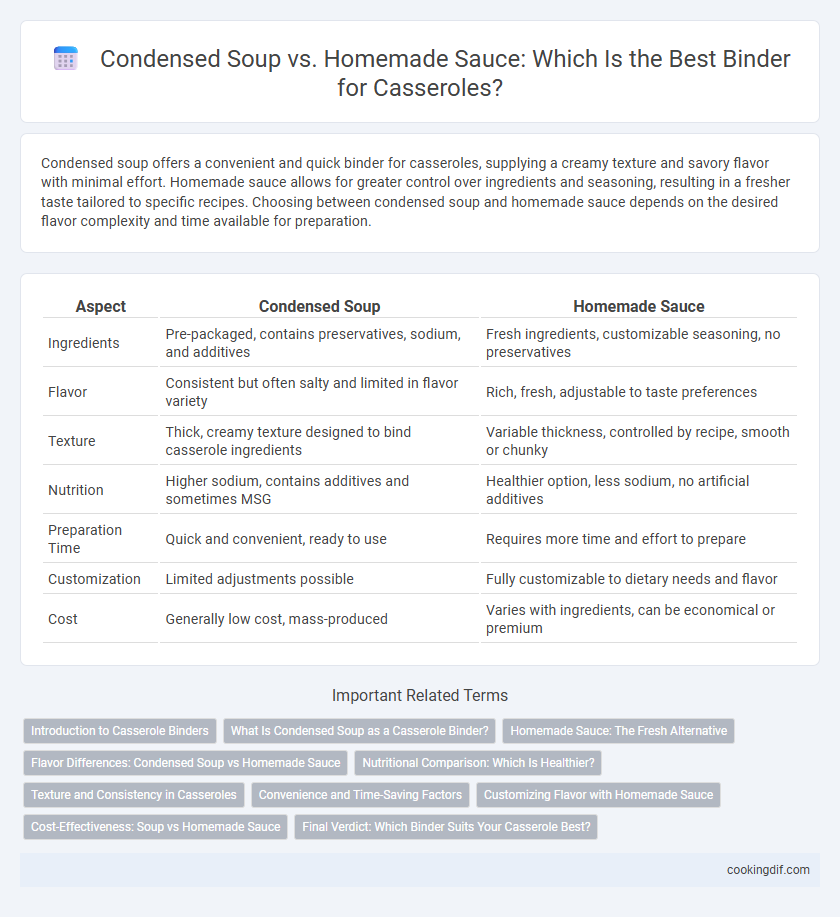Condensed soup offers a convenient and quick binder for casseroles, supplying a creamy texture and savory flavor with minimal effort. Homemade sauce allows for greater control over ingredients and seasoning, resulting in a fresher taste tailored to specific recipes. Choosing between condensed soup and homemade sauce depends on the desired flavor complexity and time available for preparation.
Table of Comparison
| Aspect | Condensed Soup | Homemade Sauce |
|---|---|---|
| Ingredients | Pre-packaged, contains preservatives, sodium, and additives | Fresh ingredients, customizable seasoning, no preservatives |
| Flavor | Consistent but often salty and limited in flavor variety | Rich, fresh, adjustable to taste preferences |
| Texture | Thick, creamy texture designed to bind casserole ingredients | Variable thickness, controlled by recipe, smooth or chunky |
| Nutrition | Higher sodium, contains additives and sometimes MSG | Healthier option, less sodium, no artificial additives |
| Preparation Time | Quick and convenient, ready to use | Requires more time and effort to prepare |
| Customization | Limited adjustments possible | Fully customizable to dietary needs and flavor |
| Cost | Generally low cost, mass-produced | Varies with ingredients, can be economical or premium |
Introduction to Casserole Binders
Casserole binders play a crucial role in achieving the perfect texture and flavor balance, with condensed soup offering convenience and consistent thickness due to its pre-seasoned blend. Homemade sauce provides greater control over ingredients, allowing customization of flavor profiles and reduction of sodium or preservatives. Understanding these binder options helps tailor casseroles to personal preferences and dietary needs, enhancing the overall dish quality.
What Is Condensed Soup as a Casserole Binder?
Condensed soup, often used as a casserole binder, is a thick, flavorful base made by removing water from soup to concentrate its taste and texture, providing both moisture and richness to dishes. It simplifies preparation by combining savory seasoning with a creamy consistency that holds ingredients together. In contrast to homemade sauces, condensed soups offer convenience and uniformity, though they may contain preservatives and higher sodium levels.
Homemade Sauce: The Fresh Alternative
Homemade sauce offers a fresh alternative to condensed soup as a binder in casseroles, providing greater control over flavor and ingredients. Using fresh herbs, spices, and quality dairy creates a creamy texture without preservatives or excess sodium found in canned soups. This approach enhances both the nutritional value and taste, elevating the overall casserole experience.
Flavor Differences: Condensed Soup vs Homemade Sauce
Condensed soup as a binder in casseroles offers a convenient, mildly seasoned flavor profile with uniform texture, often containing added sodium and preservatives that can mask fresh ingredients. Homemade sauce provides greater control over seasoning, allowing for richer, more vibrant flavors and customizable thickness tailored to the dish. Opting for homemade sauce elevates the overall taste experience by enhancing freshness and balancing flavors without overpowering the casserole's core ingredients.
Nutritional Comparison: Which Is Healthier?
Condensed soup often contains higher levels of sodium, preservatives, and added sugars, which can impact overall health negatively compared to homemade sauces made from fresh ingredients. Homemade sauces allow control over ingredients, enabling lower sodium content and the use of nutrient-rich vegetables or natural thickeners like pureed beans or whole grains. Nutritional comparison favors homemade sauces for providing fewer additives and more vitamins, minerals, and fiber, contributing to a healthier casserole binder option.
Texture and Consistency in Casseroles
Condensed soup as a binder in casseroles provides a thick, creamy texture but often results in a uniform, less customizable consistency with added preservatives and sodium. Homemade sauces offer greater control over texture and consistency, allowing adjustments in thickness and flavor intensity for a richer, fresher binding effect. Using homemade sauces can enhance the overall mouthfeel and moisture balance of casseroles, creating a more tailored and satisfying dish.
Convenience and Time-Saving Factors
Condensed soup serves as a convenient binder in casseroles, significantly reducing preparation time by eliminating the need for simmering and seasoning. Homemade sauce requires more time and effort as it involves combining fresh ingredients and adjusting flavors to achieve the desired consistency. For busy cooks, condensed soup offers a quick, reliable option without sacrificing moisture or texture.
Customizing Flavor with Homemade Sauce
Using homemade sauce as a binder in casseroles allows precise control over flavor profiles by adjusting ingredients like herbs, spices, and seasoning levels. Unlike condensed soups, which often contain preservatives and standardized flavors, homemade sauces offer fresher, customizable taste and texture. This flexibility enhances the overall dish, catering to dietary preferences or specific culinary styles.
Cost-Effectiveness: Soup vs Homemade Sauce
Using condensed soup as a binder in casseroles provides significant cost-effectiveness due to its low price and long shelf life, reducing overall meal expenses. Homemade sauce, while offering fresher flavors, requires more ingredients and preparation time, often increasing costs with items like cream, butter, and flour. Condensed soups simplify budgeting for casseroles by minimizing ingredient waste and maximizing convenience without sacrificing texture consistency.
Final Verdict: Which Binder Suits Your Casserole Best?
Condensed soup offers convenience and consistent flavor, making it a popular binder for casseroles that delivers creamy texture quickly. Homemade sauce allows customization with fresh ingredients and adjustable thickness, resulting in a more personalized and potentially healthier dish. The best binder depends on your priorities: choose condensed soup for speed and simplicity, or homemade sauce for control over taste and nutrition.
Condensed soup vs homemade sauce for binder Infographic

 cookingdif.com
cookingdif.com